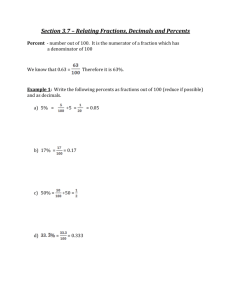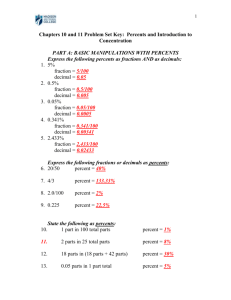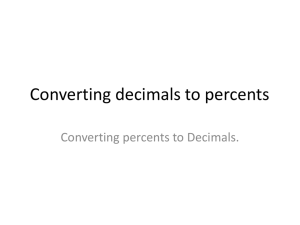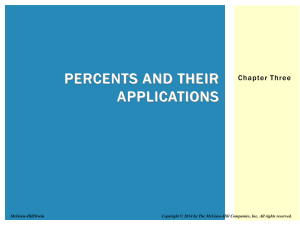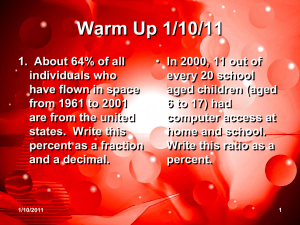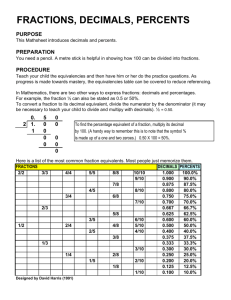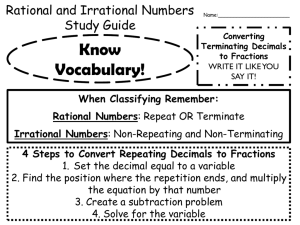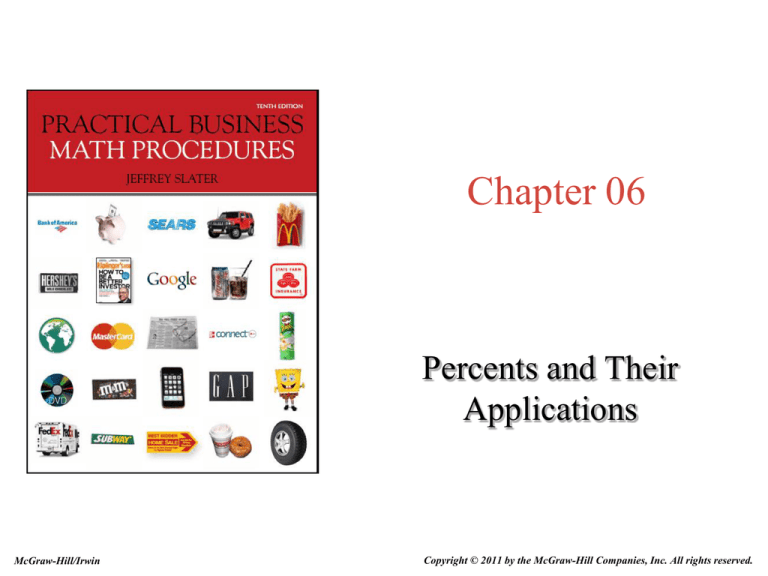
Chapter 06
Percents and Their
Applications
McGraw-Hill/Irwin
Copyright © 2011 by the McGraw-Hill Companies, Inc. All rights reserved.
#6 Percent and Their Applications
Learning Unit Objectives
LU6.1 Conversions
1. Convert decimals to percents (including
rounding percents), percents to decimals,
and fractions to percents
2. Convert percents to fractions
6-2
#6 Percent and Their Applications
Learning Unit Objectives
LU6.2 Application of Percents -- Portion Formula
1. List and define the key elements of the
portion formula
2. Solve for one unknown of the portion
formula when the other two key elements
are given
3. Calculate the rate of percent decreases
and increases
6-3
Table 6.1 - Bag of M&M’s
Color
Yellow
Red
Blue
Orange
Brown
Green
Total
6-4
Fraction
18
55
10
55
9
55
7
55
6
55
5
55
55
55 = 1
Decimal
(hundredth)
Percent
(hundredth)
.33
32.73%
.18
18.18%
.16
16.36%
.13
12.73%
.11
10.91%
.09
9.09%
1.00
100.00%
Converting Decimals to Percents
Step 1. Move decimal point 2 places to the right. You
are multiplying by 100. If necessary add zeros.
Step 2. Add a percent symbol at the end of the
number
.66
66%
8
6-5
800%
Converting Decimals to Percents
Step 1. Move decimal point 2 places to the
right. You are multiplying by 100. If
necessary add zeros.
.42.5
.425
6-6
42.5%
Rounding Percents
Step 1. When you convert from a fraction or decimal,
be sure your answer is in percent before rounding.
Step 2. Identify the specific digit. If the digit to the
right of the identified digit is 5 or greater, round the
identified digit.
Delete digits to the right of the identified digit.
1 %
17
6-7
.0588235
.0588235
5.88%
Rounding Percents
.3272727
18
55
32.73727%
32.73%
6-8
Converting Percents to Decimals
Step 1. Drop the percent symbol.
Step 2. Move decimal point 2 places to the
left, You are dividing by 100. If necessary
add zeros.
824.4%
66%
.66
6-9
8.244
Converting Percents to Decimals
Drop the percent symbol and
move the decimal point 2 places
to the left.
.4
.00.4
.4%
.004
6-10
Converting Fractional Percents to Decimals
Step 1. Convert a single fraction percent to its decimal
equivalent by dividing the numerator by the denominator.
Step 2. If a fractional percent is combined with a whole
number ( mixed fractional percent) convert the fractional
percent first. Then combine the whole number and the
fractional percent.
Step 3. Drop the percent symbol; move the decimal point
two places to the left (this divides the number by 100).
1%
4
7 34 %
.0025
6-11
.0775
Converting Fractional Percents to Decimals
.20%
.00.20
1%
5
.0020
6-12
Converting Fractions to Percents
Step 1. Divide the numerator by the
denominator to convert the fraction to a
decimal.
Step 2. Move decimal point 2 places to the
right; add the percent symbol.
3
4
6-13
1
5
75%
20%
Converting Fractions to Percents
.05
1
20
.05.
5%
6-14
Converting a Whole Percent (or a Fractional Percent) to a
Fraction
Step 1. Drop the percent symbol.
Step 2. Multiply the number by 1/100.
Step 3. Reduce to lowest terms
156%
6-15
1 14
15
1%
8
1
800
Converting a Whole Percent (or a Fractional Percent)
to a Fraction
76 x 1
100
76
100
76%
19
25
6-16
Converting Percents to Decimals
Step 1. Drop the percent symbol.
Step 2. Change the mixed percent to an
improper fraction.
Step 3. Multiply the number by 1/100
Step 4. Reduce to lowest terms
Note: If you have a mixed or decimal percent, change the decimal
portion to fractional equivalent and continue with Steps 1 to 4.
12.5%
12 1/2%
1
8
6-17
1
8
Converting a Mixed or Decimal Percent
to a Fraction
22 1
2
45 x 1 = 45
2 100 200
22.5%
9
40
6-18
Application of Percents - Portion Formula
Portion (P) = Base (B) x Rate (R)
Assume you received a small bonus check of $100 and your company did not
withhold any taxes. Compute taxes assuming a 20% in tax rate.
Base: 100% - whole. Usually given after the
word of – but not always
$100 – Bonus check
Portion “is”
Rate: Usually expressed as a percent but could
also be a decimal or fraction.
20% taxes
Portion: A number – not a percent and not the
whole
$20 taxes
6-19
Base “of”
Rate “%”
Solving for Portion
Sales of Milk Chocolate M&M’s® are 80% of
total M&M’s® sales. Total M&M’s® sales are
$400,000. What are the sales of Milk Chocolate
M&M’s®?
Portion (P)= Base (B) x Rate (R)
P = $400,000 x .80
P = $320,000
6-20
Solving for Rate
Sales of Milk Chocolate M&M’s® are 320,000.
Total M&M’s® sales are $400,000. What is the
percent of Milk Chocolate M&M’s® sales
compared to total M&M’s® sales?
Rate = Portion
Base
R = $320, 000
$400,000
R = 80%
6-21
Solving for Base
Sales of Peanut and other M&M’s® chocolate
candies are 20% of total M&M’s® sales. Sales of
Milk Chocolate M&M’s® sales are $320,000.
What are the total sales of all M&M’s®?
320,000 is 80% of
base (1.00 - .20)
Base = Portion
Rate
B = $320,000
.80
6-22
B = $400,000
Calculating Percent Decreases and Increases
Step 1. Find the difference between
amounts (such as advertising costs).
Step 2. Divide step 1 by the original
amount (the base): R = P / B. Be sure to
express your answer in percent.
6-23
Rate of Percent Increase
Sheila Leary went to her local supermarket and bought the bag of
M&M’s® shown in Figure 6.1. The bag gave its weight as 18.40
ounces, which was 15% more than a regular 1-pound bag of
M&M’s®. Sheila, who is a careful shopper, wanted to check and see
if she was actually getting a 15% increase.
Rate = Portion
Base
Diff . between old and new TV price
Old TV amount
Rate = 2.40 oz
16.00 oz
Rate = .15 or
15% Increase
6-24
Rate of Percent Decrease
The increase in the price of sugar caused the
M&M/Mars company to decrease the weight of
each 1-pound bag of M&M’s® to 12 ounces.
What is the rate of percent decrease?
Rate = Portion
Base
Diff . between old and new TV price
Old TV amount
Rate = 4 oz.
16.00 oz
Rate = .25 or
25% Decrease
6-25
Problem 6-59:
Solution:
$30.50
= 677.78%
$4.50
6-26
Problem 6-61:
Solution:
540
= .06 = 6%
9000
6-27
Problem 6-67:
Solution:
2,500 x .36 = 900 people from out of state
6-28

